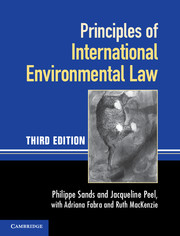Book contents
- Frontmatter
- Contents
- Foreword
- Preface and acknowledgments to the first edition
- Preface and acknowledgments to the second edition
- Preface and acknowledgments to the third edition
- Table of cases
- Table of treaties and other international instruments
- Abbreviations
- Part I The legal and institutional framework
- Part II Principles and rules establishing standards
- Part III Techniques for implementing international principles and rules
- Part IV Linkage of international environmental law and other areas of international law
- Index
Preface and acknowledgments to the third edition
Published online by Cambridge University Press: 05 June 2012
- Frontmatter
- Contents
- Foreword
- Preface and acknowledgments to the first edition
- Preface and acknowledgments to the second edition
- Preface and acknowledgments to the third edition
- Table of cases
- Table of treaties and other international instruments
- Abbreviations
- Part I The legal and institutional framework
- Part II Principles and rules establishing standards
- Part III Techniques for implementing international principles and rules
- Part IV Linkage of international environmental law and other areas of international law
- Index
Summary
Preface and acknowledgments to the third edition
This third edition of Principles of International Environmental Law provides further confirmation that international environmental law is ‘well established’ and ‘a central part of the international legal order’, as the second edition already recognised. In the intervening decade, our appreciation of the complexity of environmental problems, and their deep interlinkages with other issue areas, particularly in the economic field, has grown. In response, international environmental law has also developed increasing complexity, although largely through the consolidation and expansion of existing regimes rather than through the creation of new instruments. Case law on environmental and natural resource issues continues to be a burgeoning area of international litigation, confronting practitioners and judges with difficult new questions such as how to approach science and expert evidence in factually complex and technical disputes. Despite the myriad of legal developments, the most complex environmental problems facing international law remain some of the most pressing, particularly, climate change, marine pollution and biodiversity loss. In a certain sense, the subject of international environmental law is about to meet the point at which the rubber hits the road: can it deliver real protections, or will its impact be only marginal and cosmetic?
Like the previous editions, this edition is intended to provide a comprehensive overview of those rules of public international law that have as their object the protection of the environment. We have sought to state the law as of July 2011. Necessarily, given the vast breadth of the subject and the level of detail now available on some specific topics (climate change, fisheries, trade, biodiversity are leading examples here), the book's account of the subject area cannot be exhaustive. We have, however, sought to improve the book's coverage of key areas such as atmospheric protection and climate change, oceans and fisheries and biodiversity.
- Type
- Chapter
- Information
- Principles of International Environmental Law , pp. xxxi - xxxiiPublisher: Cambridge University PressPrint publication year: 2012
- 3
- Cited by



